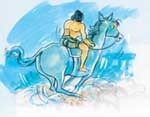|
This article is part of a continuing series on the ‘Mahavamsa’, the recorded chronicle of Sri Lankan history. Warriors Velusumana
and Mahabharana 2 This child grew up, amidst the tender care and love of his parents. When he was almost twelve years of age, he possessed special powers. He was extra-ordinarily strong and could run very fast. He used to go to the jungle with the village lads, chase the deer and rabbits and catch them. Though he was punished by his parents on many occasions, he never changed his ways. 3 When Bharana turned sixteen, he joined the hunters and went chasing wild animals. He caught them and the hunters took these animals for food. Because of these deeds, the villagers named him Warrior Mahabharana. He became a problem to his parents, who were devout Buddhists. They hated the idea of their son aiding and abetting the killing of wild animals. In spite of their repeated advice, he never reformed himself.
5 By this time, a number of warriors had arrived at Magama and the first one was Velusumana. He was from the village of Kelambiyagana. His father was a village chief named Vasabha. Vasabha had two good friends. One was named Velu and the other Sumana. When Vasabha was gifted with a son, these two friends went to see the baby carrying a lot of gifts. That happened to be the day of the ‘Naming Ceremony’.
7 Velu was the owner of a lot of horses of different breeds. All except one were well trained. The one, which belonged to the ‘Sindhu’ breed (which was reputed to be excellent among horses), would not allow anyone to ride him. He galloped very fast and put the rider down. One day, Velusumana tried his luck. The horse galloped very fast but did not unseat the rider. Thus, Velusumana succeeded in taming the horse. 8 The leader was surprised to see Velusumana tame this horse. He gave Velusumana further training in horse riding. When he noticed how clever Velusumana was, he thought it best to send him for king’s service. Accordingly, he was taken to Magama and handed over to King Kavan-Tissa. By
Halaliye Karunathilaka |
||||
Copyright © 2001 Wijeya Newspapers
Ltd. All rights reserved. |
 1
By the 2nd century BC, Ruhuna – the Southern Province, had
begun to play a very important part in the history of Sri Lanka.
The ruler there, was King Kavan-Tissa. He was busy organizing his
army to chase away the enemy in the north. At this time, there lived
a village chief named Kumara, in the village of Kapkanduru. Though
not very wealthy, he was a good-natured man. The very day his wife
gave birth to a son, he got a treasure. He thought it was due to
the good fortune of the new-born baby and so he named him ‘Bharana’.
1
By the 2nd century BC, Ruhuna – the Southern Province, had
begun to play a very important part in the history of Sri Lanka.
The ruler there, was King Kavan-Tissa. He was busy organizing his
army to chase away the enemy in the north. At this time, there lived
a village chief named Kumara, in the village of Kapkanduru. Though
not very wealthy, he was a good-natured man. The very day his wife
gave birth to a son, he got a treasure. He thought it was due to
the good fortune of the new-born baby and so he named him ‘Bharana’. 4
There came a time when the parents could no more worry about his
misdeeds. They gave up the idea of correcting him. Mahabharana understood
the situation. He got into the company of friends and began to come
home only occasionally. As the villagers began to talk about Mahabharana’s
deeds, the king’s men got to know about him. They informed
the king. King Kavan-tissa’s messengers visited Mahabharana’s
parents and told them of the king’s request. The parents were
more than happy to see their son joining the king’s service.
Mahabharana too liked the idea. He went to the king who gave him
a house close to the city. He underwent proper military training.
4
There came a time when the parents could no more worry about his
misdeeds. They gave up the idea of correcting him. Mahabharana understood
the situation. He got into the company of friends and began to come
home only occasionally. As the villagers began to talk about Mahabharana’s
deeds, the king’s men got to know about him. They informed
the king. King Kavan-tissa’s messengers visited Mahabharana’s
parents and told them of the king’s request. The parents were
more than happy to see their son joining the king’s service.
Mahabharana too liked the idea. He went to the king who gave him
a house close to the city. He underwent proper military training. 6
The two friends did not know that there was a function at Vasabha’s
residence. Vasabha of course, was very pleased to have them on that
special day. He joined the names of the two friends together and
named the son Velusumana. The friends enjoyed the hospitality of
Vasabha. Velusumana grew up to be a big boy. One day, the leaders
of the province of Velu wanted Velusumana for a couple of days.
The boy went there.
6
The two friends did not know that there was a function at Vasabha’s
residence. Vasabha of course, was very pleased to have them on that
special day. He joined the names of the two friends together and
named the son Velusumana. The friends enjoyed the hospitality of
Vasabha. Velusumana grew up to be a big boy. One day, the leaders
of the province of Velu wanted Velusumana for a couple of days.
The boy went there.